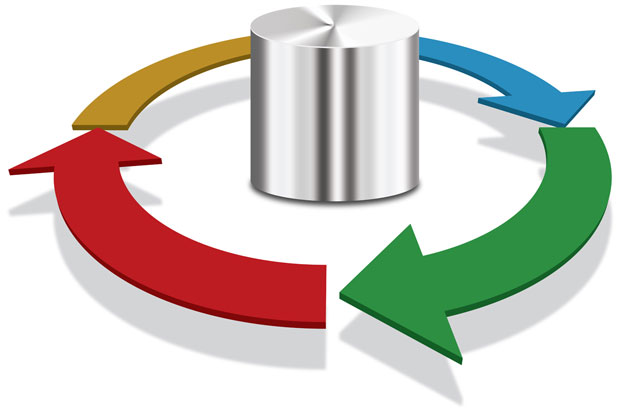Seeking Alpha is an online outfit that offers investors good research and analysis on tech vendors, and it is especially well versed in Oracle. Its writers’ expertise involves matching technologies to investment attractiveness.
I am sure you are familiar with the type. XYZ company’s product does this, it should result in sales of this much, and that will drive profits so that the stock is worth so much. You get the idea.
Seeking Alpha recently ran an interesting article with the attractive title, “The Death of the Commercial Database: Oracle’s Dilemma.”
If you’re a techie or an investor in technology, that should get your attention, since Oracle has more than 45 percent of the database market. As the saying goes, if they sneeze, we catch a cold.
What’s significant about the headline is not that databases are going away, but how. NoSQL upstarts supposedly will eat the lunches of traditional vendors — not only Oracle, but also IBM, Microsoft and SAP.
Well, maybe.
What ‘No’ Means
Everybody likes to use the mainframe as an example of how markets shrivel, and the Seeking Alpha article does too. The plug got pulled on mainframes in the 1990s, and 10 years later the market was not much more than smoke and ash. Point taken.
Although there are mainframes in use right now, and while IBM still makes them, they aren’t the growth part of the technology world any more. Yet even if the analogy holds, the conclusion drawn by the article — erroneous, in my view — is that it’s just a matter of time before Oracle et. al. join the ash heap.
This reminds me of a quip often attributed to Mark Twain: “History doesn’t repeat itself but it often rhymes.” (Sidebar: I wish I had five bucks for every witticism attributed to Twain that there’s scant evidence to support. He’s our go-to 19th century comic, I guess, though Oscar Wilde was pretty good too.)
At any rate, Seeking Alpha’s point is that the relational DB is old, it doesn’t do some things that NoSQL does, and relational therefore is in trouble. Whoa, horsey. First, in case you’d forgotten, the “No” in the name does not refer to “no” as in “no means no.” It’s actually an acronym that means “not only,” as in “yeah, we do that but we do other stuff too.”
However, there’s a performance cost. These days, it’s not a big deal, given how much compute power there is sloshing around the world and how much storage there is that doesn’t involve spinning disks, according to the Seeking Alpha article.
The RDBMS was built and tuned to the limitations of the hard drive — specifically, the fact that hard drives operate at millisecond speeds while the rest of the computing kit operates a million times faster at the nanosecond level.
That’s why performance in modern databases is tied to buffering and available memory; it’s why we have solid state disks today, and why Sun Microsystems, a part of Oracle, builds Xadata — a beast of a storage unit that consists of zero disks and lots of nonvolatile memory. Database speeds are incredible with this hardware.
So, the hard drive — not necessarily the SQL or NoSQL database — is the poky component, but we already knew this. NoSQL affords some nice advantages for businesses collecting nonstandard or unstructured data, which I won’t delve into here, but suffice it to say it’s useful.
That doesn’t mean the SQL DB is late for the door. In fact, now that in-memory databases are a thing, it’s useful to consider how best to use the performance premium provided. I think some of it necessarily will be invested in security, encryption and other approaches. In fact, we’re already seeing this.
New Tricks
If I’ve learned anything studying economic cycles, it’s that when the tide turns and most of a once-dominant technology exits, some part of it remains and continues to occupy a spot in the economy and the technology firmament.
We’re seeing this kind of transformation right now, as electricity is taking an increasing market share away from the internal combustion engine. Cars running purely on electricity are in our future, but fossil fuel will be an important part of the economy for quite some time.
Seeking Alpha makes a big deal about pricing models, and how every customer that goes to the cloud is a customer lost by Oracle or the others — to which I say, “And?” Pricing models come and go to fit the use patterns of customers. Back in the day, these models represented a stair-step based on number of users, with pricing increments set at multiples of eight, because that was how the hardware guys built interface cards. All I am saying is that things can change, and they will.
As far as technology goes, keep in mind that Oracle today has about 420,000 enterprise customers around the world. The company is trying to get them to the cloud and projects that it will take a decade or more to migrate this huge number of running businesses. That will put most of them on Oracle platforms, and somehow I expect that Oracle will find a way to charge for the value it delivers.
As for the emerging market for NoSQL, I’ve seen Oracle transition before — notably when the company decided it was time to catch up to the cloud computing craze. Oracle can do it again.
We’ve seen upstart vendors deploy surround strategies in which they land a small solution on a customer and gradually swallow up all the business. That was a long time ago, when most businesses were pretty green.
This time, look for incumbents to parry the threat posed by the upstarts with innovative pricing models, new products, and service, service, service. In the challenge to Oracle’s dominant position, I see opportunity and only a little threat — and I am sure the company and its leadership does too.
























































Social CRM
See all Social CRM